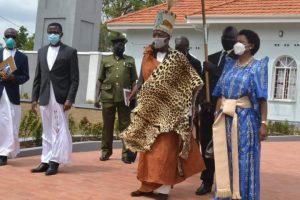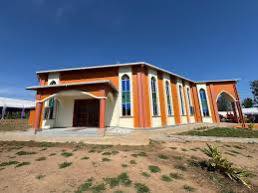By Denis Jjuuko
In the 1990s, with many of Uganda’s population dying from preventable diseases, there was need for massive vaccinations. Many parents and guardians of children looked at vaccinations with a suspicious eye — same way some people look at COVID-19 vaccinations. The Bazungu, people argued, want them dead. Vaccines, the argument went had a secret ingredient to stop Africans from giving birth so the Bazungu can take their land.
The antivaxxers were taking the day and winning the argument. Kabaka Ronald Mutebi appeared in Mawokota and immunized just one baby. With cameras clicking, the antivaxxers lost the argument. The Kabaka loves his people and therefore can’t be part of a scheme to kill them. Many parents and guardians who were previously skeptical embraced the vaccination campaign.
As Kabaka Mutebi marked his 28th anniversary last weekend, his influence on health and education has been immense. His role didn’t end with immunizations. We know much more about fistula and sickle cell disease because of his recent campaigns to create awareness and then find remedies especially through the revived Kabaka Birthday Run that is held every April.
As the UNAIDS Goodwill Ambassador for Male Engagement on HIV/AIDS, there is hope that when studies finally come out, there will be much more reductions in numbers of people getting infected by this disease and perhaps have it fully eliminated by 2030.
Kabaka Mutebi has in the last 28 years used his immense political and social power to influence development. Education is important if people are to be healthy and it is only a healthy informed population that can get itself out of poverty. Of course, this didn’t start with Mutebi, his predecessors pushed for sanitation in homes. Lack of a pit latrines or a rack for utensils was unacceptable — a reminder that Buganda had always put its people at the forefront. But for the 27 years, the kingdom had been abolished, people had given up hope.
His education schemes including bursaries awarded not only to the people of Buganda but to all Ugandans from across the country are perhaps the biggest such programme in the country. Many people today including some that are now becoming leaders got their education through the Kabaka’s Education Fund. He didn’t stop there, he set up schools among them a technical institute and a fully-fledged university.
Today, through poverty alleviation programmes like Emmwanyi Terimba, we are seeing unprecedented numbers of coffee exports with 618,388 bags of 60kgs exported in June 2021 alone. People who had abandoned coffee in Buganda are growing it again. Most of Uganda’s coffee is grown in Buganda. Where people grow coffee, they also grow Matooke ensuring food security for the region. Borrowing from CBS FM’s successful Pewosa programme, there is need to organize these farmers at village, parish, subcounty and county levels into cooperatives so they can use their collective power to advance their interests such as owning milling and processing plants and starting exporting companies.
The kingdom budget has increased from zero in the 1990s to Shs121 billion in 2021. All this growth is having an effect on the region and the country at large. In the last 28 years, the kingdom has set up 33 companies and organisations, which directly employ Ugandans and pay taxes to the government of Uganda thereby contributing to national development.
Although so much has been achieved already, there is so much that needs to be done. The people of Buganda want a modern hospital. Although that may be a tall order at the moment, it is possible. However, the kingdom could start with telemedicine. Using its 18 county headquarters as a base to set up commercially viable clinics and then deploy technology to reach people. Most people, like we have seen with COVID-19, don’t need to visit hospitals. Doctors and healthworkers can reach them using videocalls and other such options. A lab worker can then go to them to get samples for testing and then medicine is prescribed. A future prosperous Buganda will have to rely a lot on technology to reach people.
Drawing on the experiences of male engagement on HIV/AIDS, the kingdom may also need to do some work on the boy child especially in urban areas. Previously, once a boy turned 18, they left their father’s house and went to start life on their own. That made people prosperous because they used most of their energetic years working hard. Today, many of the highly educated urban male youth are comfortable talkers and not doers. Owning the latest iPhone has become a yardstick for success. Role modelling for them is important and nobody is more suited for this than Kabaka Mutebi and his team of administrators.
The writer is a communication and visibility consultant. djjuuko@gmail.com









